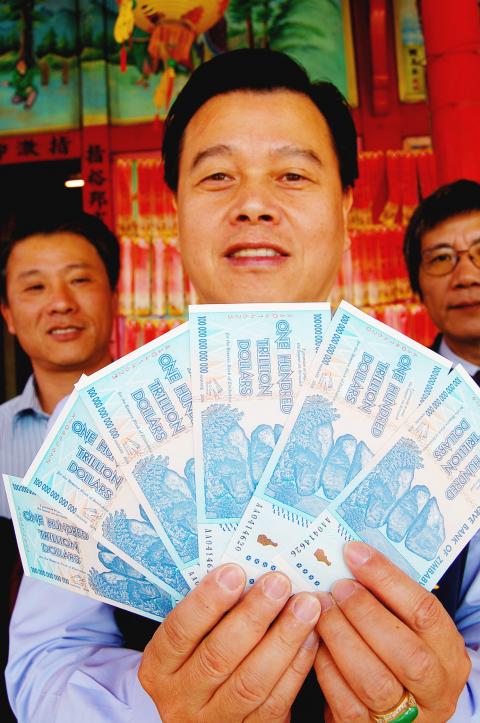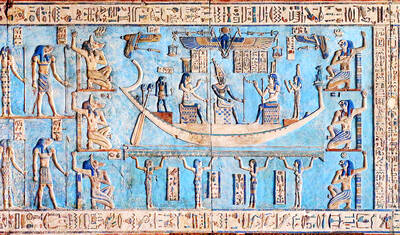Have you ever seen a 100 trillion dollar gift money red envelope? Jhihtian Temple in Yilan County’s Wujie Township recently held an event last Thursday in which participants cast divination blocks. Anyone who got three positive results from the gods was given a red envelope containing 100 trillion Zimbabwean dollars.
The temple authorities prepared 100 red envelopes to give away at the event.
The ninth day of the first month in the lunar calendar is the birthday of the Jade Emperor, the supreme divinity in Chinese mythology. Jhihtian Temple, which honors the Jade Emperor, planned a series of events to mark the day. When a friend of temple committee chairman Yang Pi-tsun gave him the 100 trillion Zimbabwean dollar banknotes, he was taken aback and said “What? 100 trillion?” He decided to put 100 of the banknotes in red envelopes as gifts for people who came to the temple to cast divination blocks. Some devotees were surprised at the sight of 14 zeros on a single banknote, saying that this was the first time they had ever seen a banknote with such a big denomination. The highest-denomination banknote in Taiwan is NT$2,000.

PHOTO: CHIANG CHIH-HSIUNG, LIBERTY TIMES
自由時報記者江志雄攝
So what are 100 trillion Zimbabwean dollars worth in New Taiwan dollars? Those in the know say they are pro-bably worth only a couple of dozen dollars in Taiwanese currency. Yang says that Zimbabwe has very high inflation, and the value of its currency is adjusted several times a day. He knows people who collect currencies from all over the world, and they say that a 100 trillion Zimbabwean dollar banknote is traded at no more than NT$300.
Yang says that giving out 100 trillion dollar banknotes on the 100th year of the Republic of China symbolizes that everything will go smoothly in the centenary year.
Zimbabwe’s economy isn’t performing well, and the country often issues new currency. Four versions of the currency have been issued since the country gained formal independence in 1980. These 100 trillion dollar banknotes come from the third currency issue, which was popular when it was first issued. But the Zimbabwean dollar depreciated drastically and was soon worth no more than a piece of wallpaper. Zimbabwean civil servants prefer to receive their salaries in US dollars. It is said that no one would even bother to pick a Zimbabwean dollar banknote up from the ground, and piles of the money have been sold as waste paper for recycling.
Foreign tourists in Zimbabwe often take Zimbabwean money home as a souvenir, or sell it online for a bit of extra cash. Apparently some grownups in Taiwan used to give these banknotes to children as gift money, but when the children saw so many zeros on the notes, they rejected them, thinking they were just toy money.
(LIBERTY TIMES, TRANSLATED BY TAIJING WU)
一百兆元紅包,您看過嗎﹖宜蘭縣五結鄉指天宮慶祝天公生,上週四舉辦擲筊趣味競賽,連續擲出三個聖筊,便可獲贈面額一百兆的辛巴威幣。
宮方準備百份「超級紅包」大相送。
農曆正月初九是天公生,主祀玉皇大帝的五結鄉指天宮,規劃系列慶祝活動。「啥米,一百兆﹖」指天宮主委楊碧村獲友人贈送辛巴威幣,他拿出百張面額一百兆的大鈔,置入紅包袋,當作擲筊獎品,有些信眾仔細一瞧,紙鈔上寫有十四個零,直指台幣最大面額不過兩千元,他們這輩子第一次看到這麼大面額鈔票。
一百兆的辛巴威幣,折合台幣多少錢﹖行家認為,應該只有新台幣幾十元的價值﹔楊碧村說,辛巴威通膨嚴重,幣值一日數變,他知道有人在蒐集各國貨幣,全新的一百兆辛巴威幣,最高喊到新台幣三百元。
楊碧村說,今年適逢建國百年,贈送一百兆辛巴威幣,象徵百事皆順。
辛巴威經濟不佳,經常換發新貨幣,一九八零年獨立建國至今,換了四代幣,一百兆為三年前問世的三代幣,因為面額驚人,發行初期造成轟動,後來重貶而淪為壁紙,辛國公務員改領美元,據說辛幣掉在街上沒人願意撿,成綑鈔票被當成回收廢紙賣。
造訪辛巴威的外國遊客,常把辛幣帶回國當紀念品,或拿去網拍發筆小財,網友流傳說,台灣有人用一百兆辛幣,送給朋友小孩當紅包,小朋友看到這麼多個零,誤以為玩具鈔而當面退回,鬧過不少笑話。
(自由時報記者江志雄)

A: I’m glad that the Grammys will honor the late pop diva Whitney Houston with a Lifetime Achievement Award. Who are this year’s leading nominees? B: Kendrick Lamar is leading the nominations with nine nods, followed by Lady Gaga with seven nods. Bad Bunny, Sabrina Carpenter and Leon Thomas each gained six nods. A: I heard that the song “Golden” from global animated blockbuster KPop Demon Hunters received three nominations, including Song of the Year. B: Blackpink’s Rose and Bruno Mars’ “APT.” also received major recognition with multiple nominations, including Record of the Year, setting a milestone for

It graced statues, colored coffins, and decorated artifacts. It is Egyptian blue, the world’s oldest-known synthetic pigment born in ancient Egypt. Despite its name, it is not limited to a single hue. It ranges from deep blue to greenish tones, often glowing with an almost unearthly brilliance. __1__ In response, the ancient Egyptians developed a synthetic alternative. Not only was it visually striking, but it was also more affordable than imported indigo or natural lapis lazuli. Traces of the pigment have been discovered far beyond Egypt, from wall paintings in Pompeii to tiles in Mesopotamia. However, Egyptian blue began to fall

Bilingual Story is a fictionalized account. 雙語故事部分內容純屬虛構。 Just yesterday, the boy had helped hang the lucky red couplets. Tonight, as firecrackers signaled the New Year, he lay in bed burning with a surging fever. The herbalist checked the boy’s pulse and went still. “The only cure is in the county town across the mountains,” he said. “But the snow is deep, and the shops are shuttered until the Fourth Day.” The boy’s father looked at the window. “I will go.” “The roads are impassable for a cart,” the herbalist warned. “And too far for a man on foot.” The concerned neighbor

Contrary to popular belief, glass bottles may pose a greater microplastic risk than plastic ones. A recent study found that beverages stored in glass bottles can contain up to 50 times more microplastic particles than those in plastic containers. Researchers traced most of the contamination to the paint on the outside of the metal caps. The particles found in the drinks matched the cap’s coating in both color and composition. Experts suggest the issue may result from microscopic scratches that form as caps rub against each other during transport or storage. Such scratches can damage the painted coating, leading